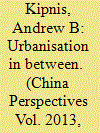| Srl | Item |
| 1 |
ID:
088012


|
|
|
|
|
| Publication |
2009.
|
| Summary/Abstract |
This paper examines the broad range of informal land transactions and arrangements migrants are entering into with customary landowners to gain access to customary land for export cash cropping in the oil palm belt of West New Britain, Papua New Guinea. Whilst these arrangements can provide migrants with relatively secure access to land, there are instances of migrants losing their land rights. Typically, the land tenure arrangements of migrants with more secure access to land are within a framework of property rights for social inclusion whereby customary landowners' inalienable rights to land are preserved and the 'outsider' becomes an 'insider' with ongoing use rights to the land. Through socially embedding land transactions in place-based practices of non-market exchange, identities of difference are eroded as migrants assume identities as part of their host groups. This adaptability of customary land tenure and its capacity to accommodate large migration in-flows and expanding commodity production undermines the argument common amongst proponents of land reform that customary tenure is static and inflexible. Before such claims are heeded, there must be more detailed empirical investigations of the diverse range of land tenure regimes operating in areas of the country experiencing high rates of immigration.
|
|
|
|
|
|
|
|
|
|
|
|
|
|
|
|
| 2 |
ID:
166382


|
|
|
|
|
| Summary/Abstract |
This article investigates democratic performance of policy networks. To shed new light on this topic, the social embeddedness, i.e. social and economic ties of actors in and around policy networks are analysed. A qualitative case study of energy policy networks in Finland is presented. Energy-intensive industries, incumbent utilities and the government are the main actors in policy networks. There are also extensive ties between them. Wind energy developers are formally linked to the networks. However, they have few possibilities to participate in the policy processes or to make an impact on policies. Similarly, representation of the people is poor. Also, the policy debates are not open-ended. Hence, it appears that the policy actors' social embeddedness casts a shadow on the democratic anchorage of the policy networks. Based on these tentative findings, it is concluded that the democratic performance of policy networks should be investigated, not assumed.
|
|
|
|
|
|
|
|
|
|
|
|
|
|
|
|
| 3 |
ID:
122931


|
|
|
|
|
| Publication |
2013.
|
| Summary/Abstract |
This article focuses on the lived experiences of people who have moved to Zouping, a rapidly urbanising city in Shandong Province. It argues that the variety of their experiences reveals much about Chinese processes of urbanisation. Recent writing on Chinese urbanisation often portrays a sharp social break with rural experience. This article discusses the variable degrees of continuity with rural pasts that different groups of new urbanites experience. It presents Zouping as an intermediate case of Chinese urbanisation, illustrating aspects of both migrant and in situ development, and also argues for the importance of attention to divergent examples of lived experiences, which often blend or transcend the ideal types presented in models of urban experience.
|
|
|
|
|
|
|
|
|
|
|
|
|
|
|
|
| 4 |
ID:
149985


|
|
|
|
|
| Summary/Abstract |
This opinion paper seeks to initiate discussion of the institutional and societal causes of oil price. On this basis, the social embeddedness concept is proposed instead of the frequently used producer-consumer juxtaposition. Observation shows no linearity between resource distribution imbalances and supply dynamics on the one hand and price on the other. As a socially endogenous factor, oil price generates practices and norms comprising benchmarks for resource valuation, stock market dynamics and risk aversion practices. A high oil price incentivises investments and inter-fuel competition, whereas a low oil price increases both political and market risks beyond the consumer-producer conceptualisation. Hence, it is argued that the notion of oil price affordability in energy security should be revised.
|
|
|
|
|
|
|
|
|
|
|
|
|
|
|
|